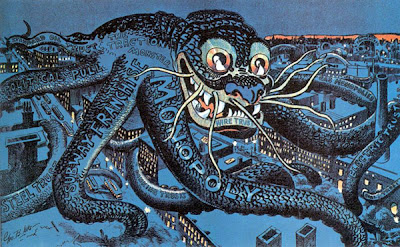.
A while back, a publishing insider explained to me in detail how the history of Twenty-First Century publishing to date can be read as an epic battle between Google and Amazon over who gets to control everything. It was terrifying to hear.
Google made its big move by preemptively claiming the right to publish and sell electronic versions literally every book that had ever been or ever will be written without asking permission of the copyright owners. The courts squashed that one. Now Amazon is responding by trying to dictate the prices and profit margins of every publisher who sells through them. The entire story is big, complicated, and ugly. But one aspect of it is simple enough: Small and medium presses operate on a thin profit line. Squeeze them hard enough and a lot of them will go under.
Today I received the following letter from Jill Roberts, Managing Editor of Tachyon Publications, a very fine small press that publishes (among many other books) most of my short fiction collections:
Dear Tachyon authors, artists, and friends--
Regrettably, due to a contract dispute, our e-book titles are currently not available at Amazon.com. Amazon.com made a unilateral decision to remove over 5000 Kindle e-books from its site this week, including all Tachyon e-books.
The issue is the Kindle contract between our book distributor, IPG, and Amazon. IPG's Kindle contract came up for renewal. Amazon took the opportunity to ask for yet another larger cut of Kindle book sales. IPG took a stand and refused. In response, Amazon.com has pulled all of the e-books by IPG's publishers.
While this means for the time being that you won't be able to buy Tachyon e-books at Amazon.com, there are many other excellent options. Our books are still available in print and in EPUB and PDF electronic editions from local independent bookstores (find them on www.indiebound.org), and on web sites such as Barnes & Noble (www.barnesandnoble.com), the Sony bookstore (www.ebookstore.sony.com), Apple's iTunes, Google Books and elsewhere. You can also purchase Kindle and other e-book formats from our friends at Weightless Books (www.weightlessbooks.com). Free software programs such as Calibre (www.calibre-ebook.com) can be used to convert non-Kindle e-files to Kindle readable formats. Kindle Fire users can download programs from the Amazon app store to read non-Kindle formats.
Please feel free [to] spread the word about this unfortunate situation and let me know if you have any questions. This fight between Amazon and IPG is another chapter in Amazon's continuing effort to control the marketplace, which is ultimately a bad thing for publishers and authors. For now there are only two certainties: change in the publishing industry is inevitable, and Tachyon will do its best to continue to publish the most thought-provoking and challenging speculative fiction available.
Regards,
Jill Roberts
Managing Editor
Tachyon Publications
smart science fiction & fantasy
If you dislike corporate bullying, and would like to register your opinion, I have a simple and easy proposal: Buy an excluded e-book from one of the venues Jill mentioned. It doesn't have to be from Tachyon -- some five thousand e-books have been expunged from Amazon. You've got a lot of choice.
And let's face it: You don't own enough books.
You can read about the issue here.
*




7 comments:
Here, here!
Nice picture of, uh, who is that? Amazon? Google? The teacher's union?
It's Jeff Bezos. Dude has put on some weight lately.
Whoops, mangled my last comment.
Tom Purdom rules.
Yeah, Bezo's must've put on 40 kilos after Amazon stuffed Abebooks into its gullet. Bah to them and the 'don't be evil' hypocrites.
One more reason to stop buying stuff from Amazon. Love the cephalopod!
Tom Purdom does indeed rule. I heard him read "Bonding With Morry" tonight at Philly Fantastic, and he wowed the audience. Everybody laughed in the right places, understood the story as he meant it to be understood, and liked it immensely. And then a batch of us went out to dinner together. A very pleasant evening indeed.
It's a pretty unfortunate situation, but I don't really get the monopoly reference... let's say you want people who don't have Kindles to be able to read your book on a portable device- does Amazon make it impossible for someone who sells on their site to sell digital texts through other vendors?
I understand they have a huge amount of leverage due to the size of their customer base, of course. Maybe I'm being too literal.
A monopoly isn't the ONLY corporation in its economic niche, merely one that's large enough to dictate terms that its customers wouldn't accept in a free market. Amazon fits the definition amply.
Post a Comment